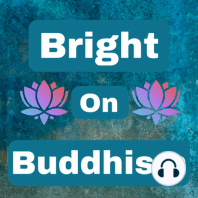30 min listen
What is evil in Buddhism?
ratings:
Length:
23 minutes
Released:
Mar 17, 2023
Format:
Podcast episode
Description
Bright on Buddhism - Evil - What is evil in Buddhism? How does the conception of evil change over time? According to the Buddhist scriptures, what ought to be done about evil?
Content warning - This episode contains descriptions of violence and killing. Listener discretion is advised.
Resources: Curley, Melissa Anne-Marie, Jessica L. Main, and Melanie Coughlin. “The Self-Awareness of Evil in Pure Land Buddhism: A Translation of Contemporary Kyoto School Philosopher Keta Masako.” Philosophy East and West 67, no. 1 (2017): 192–228. http://www.jstor.org/stable/44135555.; Whitley R. P. Kaufman. “Karma, Rebirth, and the Problem of Evil.” Philosophy East and West 55, no. 1 (2005): 15–32. http://www.jstor.org/stable/4487934.; Gregory, Peter N. “The Problem of Theodicy in the ‘Awakening of Faith.’” Religious Studies 22, no. 1 (1986): 63–78. http://www.jstor.org/stable/20006258.; Sharma, Ursula. “Theodicy and the Doctrine of Karma.” Man 8, no. 3 (1973): 347–64. https://doi.org/10.2307/2800314.; Gray, David B. “The Rhetoric of Violence in the Buddhist Tantras.” Journal of Religion and Violence 6, no. 1 (2018): 32–51. https://www.jstor.org/stable/26671557.; Silk, Jonathan A. “Good and Evil in Indian Buddhism: The Five Sins of Immediate Retribution.” Journal of Indian Philosophy 35, no. 3 (2007): 253–86. http://www.jstor.org/stable/23497451.; James W. Boyd. “Symbols of Evil in Buddhism.” The Journal of Asian Studies 31, no. 1 (1971): 63–75. https://doi.org/10.2307/2053052.; Dalton, Jacob P. “Evil and Ignorance in Tantric Buddhism.” In The Taming of the Demons: Violence and Liberation in Tibetan Buddhism, 23–43. Yale University Press, 2011. http://www.jstor.org/stable/j.ctt5vkw2s.5.; ZIPORYN, BROOK A. “TIANTAI ETHICS AND THE WORST-CASE SCENARIO.” In Emptiness and Omnipresence: An Essential Introduction to Tiantai Buddhism, 235–72. Indiana University Press, 2016. http://www.jstor.org/stable/j.ctt1bmzm9d.15.; Wakabayashi, Haruko. The Seven Tengu Scrolls: Evil and the Rhetoric of Legitimacy in Medieval Japanese Buddhism. University of Hawai’i Press, 2012. http://www.jstor.org/stable/j.ctt6wqm13.; Dobbins, James C. “D. T. Suzuki, Amida Buddha, and the Problem of Karma.” The Eastern Buddhist 1, no. 2 (2021): 89–98. https://www.jstor.org/stable/48711024.; MacIntyre, Alasdair (1984). After Virtue: A Study in Moral Theory (2nd ed.). Notre Dame, Indiana: University of Notre Dame Press.; Batchelor, Stephen (2015). After Buddhism: Rethinking the Dharma for a Secular Age. Yale University Press.; Gombrich, Richard. “Buddhist Karma and Social Control.” Comparative Studies in Society and History 17, no. 2 (1975): 212–20. http://www.jstor.org/stable/178004.; Kalupahana, David J., and G. P. Malalasekera. “Karma and Rebirth.” In Buddhist Philosophy: A Historical Analysis, 44–55. University of Hawai’i Press, 1976. http://www.jstor.org/stable/j.ctt6wqjnw.11.; James P. Mc Dermott. “Is There Group Karma in Theravāda Buddhism?” Numen 23, no. 1 (1976): 67–80. https://doi.org/10.2307/3269557.
Do you have a question about Buddhism that you'd like us to discuss? Let us know by finding us on email or social media! https://linktr.ee/brightonbuddhism
Credits:
Nick Bright: Script, Cover Art, Music, Voice of Hearer, Co-Host
Proven Paradox: Editing, mixing and mastering, social media, Voice of Hermit, Co-Host
---
Send in a voice message: https://podcasters.spotify.com/pod/show/brightonbuddhism/message
Content warning - This episode contains descriptions of violence and killing. Listener discretion is advised.
Resources: Curley, Melissa Anne-Marie, Jessica L. Main, and Melanie Coughlin. “The Self-Awareness of Evil in Pure Land Buddhism: A Translation of Contemporary Kyoto School Philosopher Keta Masako.” Philosophy East and West 67, no. 1 (2017): 192–228. http://www.jstor.org/stable/44135555.; Whitley R. P. Kaufman. “Karma, Rebirth, and the Problem of Evil.” Philosophy East and West 55, no. 1 (2005): 15–32. http://www.jstor.org/stable/4487934.; Gregory, Peter N. “The Problem of Theodicy in the ‘Awakening of Faith.’” Religious Studies 22, no. 1 (1986): 63–78. http://www.jstor.org/stable/20006258.; Sharma, Ursula. “Theodicy and the Doctrine of Karma.” Man 8, no. 3 (1973): 347–64. https://doi.org/10.2307/2800314.; Gray, David B. “The Rhetoric of Violence in the Buddhist Tantras.” Journal of Religion and Violence 6, no. 1 (2018): 32–51. https://www.jstor.org/stable/26671557.; Silk, Jonathan A. “Good and Evil in Indian Buddhism: The Five Sins of Immediate Retribution.” Journal of Indian Philosophy 35, no. 3 (2007): 253–86. http://www.jstor.org/stable/23497451.; James W. Boyd. “Symbols of Evil in Buddhism.” The Journal of Asian Studies 31, no. 1 (1971): 63–75. https://doi.org/10.2307/2053052.; Dalton, Jacob P. “Evil and Ignorance in Tantric Buddhism.” In The Taming of the Demons: Violence and Liberation in Tibetan Buddhism, 23–43. Yale University Press, 2011. http://www.jstor.org/stable/j.ctt5vkw2s.5.; ZIPORYN, BROOK A. “TIANTAI ETHICS AND THE WORST-CASE SCENARIO.” In Emptiness and Omnipresence: An Essential Introduction to Tiantai Buddhism, 235–72. Indiana University Press, 2016. http://www.jstor.org/stable/j.ctt1bmzm9d.15.; Wakabayashi, Haruko. The Seven Tengu Scrolls: Evil and the Rhetoric of Legitimacy in Medieval Japanese Buddhism. University of Hawai’i Press, 2012. http://www.jstor.org/stable/j.ctt6wqm13.; Dobbins, James C. “D. T. Suzuki, Amida Buddha, and the Problem of Karma.” The Eastern Buddhist 1, no. 2 (2021): 89–98. https://www.jstor.org/stable/48711024.; MacIntyre, Alasdair (1984). After Virtue: A Study in Moral Theory (2nd ed.). Notre Dame, Indiana: University of Notre Dame Press.; Batchelor, Stephen (2015). After Buddhism: Rethinking the Dharma for a Secular Age. Yale University Press.; Gombrich, Richard. “Buddhist Karma and Social Control.” Comparative Studies in Society and History 17, no. 2 (1975): 212–20. http://www.jstor.org/stable/178004.; Kalupahana, David J., and G. P. Malalasekera. “Karma and Rebirth.” In Buddhist Philosophy: A Historical Analysis, 44–55. University of Hawai’i Press, 1976. http://www.jstor.org/stable/j.ctt6wqjnw.11.; James P. Mc Dermott. “Is There Group Karma in Theravāda Buddhism?” Numen 23, no. 1 (1976): 67–80. https://doi.org/10.2307/3269557.
Do you have a question about Buddhism that you'd like us to discuss? Let us know by finding us on email or social media! https://linktr.ee/brightonbuddhism
Credits:
Nick Bright: Script, Cover Art, Music, Voice of Hearer, Co-Host
Proven Paradox: Editing, mixing and mastering, social media, Voice of Hermit, Co-Host
---
Send in a voice message: https://podcasters.spotify.com/pod/show/brightonbuddhism/message
Released:
Mar 17, 2023
Format:
Podcast episode
Titles in the series (100)
What is Zen Buddhism? by Bright On Buddhism
